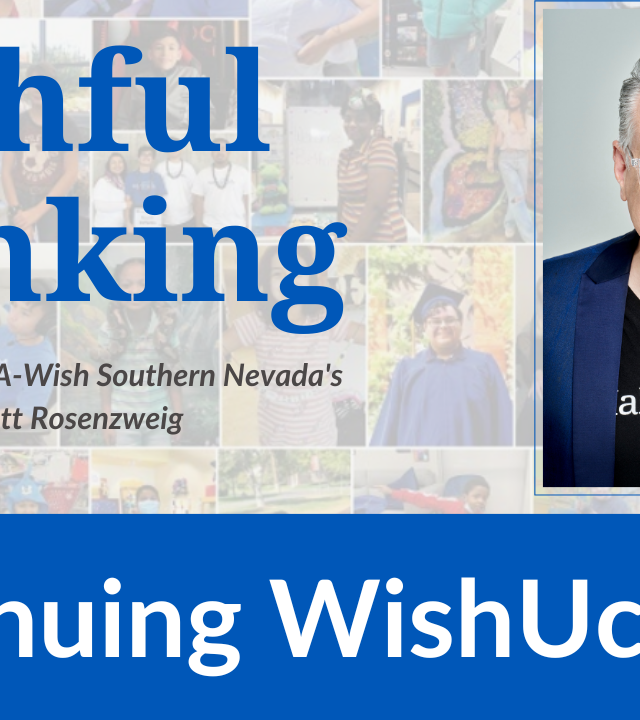
I’ve been involved in this Wish thing for over six years now, and it never ceases to amaze me how many people allegedly love our mission of giving kids with critical illnesses life-changing wishes, yet they know very little about what we do.
So, consider this your continuing education course. Or as I like to call it, your Continuing Wishucation.
The biggest myth or misconception is that we only grant wishes to children with terminal illnesses. Not true. Yes, Make-A-Wish began with this concept but quickly learned that the prescription of hope only Make-A-Wish can provide was needed by any child between the ages of 2 ½ to 18 going through a life-threatening illness. In fact, it was reported recently that 86% of the kids who get a wish go on to lead extraordinary lives. I could point to Maria, who wanted to be a published author (Wish Granted) who is now in her twenties and working for another major nonprofit organization. Or Daniel, who had his wish granted in the 1990s and is now married with two kids and is the Director of Retail for one of the properties on The Strip. So, if you take nothing else away from this course, please keep in mind that we are not a dying wish anymore (in most cases).
The above misconception, I sort of get, and if I’m being honest, I had it too before joining the organization, but lately, there’s been a second misconception creeping into people’s conversations with me and we also received an email in a similar vein that leaves me just shaking my head.
I recently had a long-time donor, and we also received an email to our info@ address that basically challenged our methodology. Yes, to my face, it was said something to the effect that we only want to support wishes for children whose parents can’t afford to give them to their children themselves. WHAT!?! Wow, welcome to missing the point of our mission entirely.
A wish is not about money or capabilities on the family’s part. Money and capabilities are what my team and I worry about and take care of every day. A wish is meant to do a few things but at the root of it all, it’s to provide hope. When a child finds out they are getting a wish, they tend to stick to treatment more, require less medication, and stay healthy longer. Yes, there are scientific studies that state this fact now. And none of those three things above (with the exception of medication which costs keep rising) have to do with money. We’re meant to take the child out of their medical treatment and work on their mental health by helping them to find their voice and make a choice that can only be a Wish child’s alone. You see, kids with critical illnesses often experience great guilt that they’re the sick child in the family, taking time from their parents or other siblings, etc. and so often they lose their voice. You see, they have parents telling them what to do, teachers telling them what to do and doctors telling them what to do. But what a Wish does, is it allows the child to find their voice for the decision on what the child’s wish is, is the child’s alone. It’s the most magical thing in the world to be with a child when they begin to get their voice, imagine possibilities outside of their treatment or what they know, and dream about their future. Our volunteers and staff who do this Wish Discovery process are some of the most dedicated and lucky people I know.
We are not here to judge people or to examine anyone’s socioeconomic standing in the world. We’re here to provide hope for children with critical illnesses and, along the way, hope for their families and the community that helps us grant all these wishes. It’s the most noble thing in the world to provide hope and light in some of the darkest times. Yes, it takes money to grant wishes, but again, that’s on us (see the donate button at wish.org/snv), never a family’s concern.
As I walk away from donors who don’t get our mission, I’ll continue to try to educate the public at large. And like most things, I’ll sleep better at night. Could I have used that money? Absolutely. Will I contort myself or our mission to make a donor feel better about a donation? Nope.
So, please, if you want to be a part of something incredible, join our mission. Or the mission of any nonprofit organization that speaks to you but learn what they’re about first, so I don’t have to pull out my whiteboard and give you a Continuing WishUcation class.
A quote a Wish Mom shared with us comes to mind. They were on a boat in Hawaii as part of their wish, and the child turned to his mother and said, “Today’s the first day I feel like a regular kid like I never had cancer.” THAT’S the power of a Wish! That’s why we do what we do. Join us if you want to provide moments like these to kids with critical illnesses.